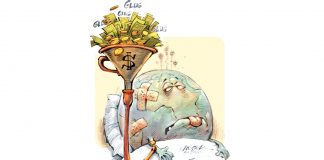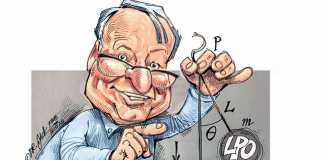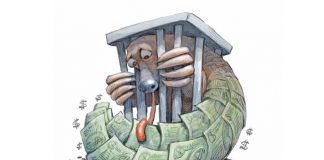Former state president FW de Klerk recently presented a lecture on the state of African governance at the University of Pretoria. De Klerk evaluated Africa’s performance since the establishment of Nepad six years ago. He also emphasised the importance of agriculture in Africa, and how unfair tariffs are crippling the continent, making it difficult for Africans to compete in the one area where they have a natural advantage.
The perception is that africa is lagging further behind in the global race. Between 1975 and 2000, GNP per capita income in sub-Saharan Africa declined by an average of 0,7% per year, compared with an average annual growth of 2,2% for the rest of the developing world during the same period.
Between 1960 and 2000 the human development index in the developing world as a whole increased from 0,260 to 0,655 on a scale where 1,0 represents the highest levels of development. However, in sub-Saharan Africa it increased only from 0,2 to 0,486. This has led to the development of what is called “pessimism”. if we look at with greater discernment we begin to realise how unfair this perception is.
There are too many countries that continue to conform to the African stereotype of poverty, conflict and tyranny. However, such states conform to the stereotype not because they are African, but because poverty, tyranny and conflict go hand in hand throughout the world.
The challenge for the world, and for Africa, is to address the root causes of the vicious cycle of poverty, conflict and tyranny in Africa. It is a challenge has accepted.
In July 2001 African leaders adopted the basic framework of the New Partnership for Africa’s Development (Nepad). Through Nepad, they pledged to promote peace, stability, democracy, sound economic management and people-centred development. They promised that they would hold each other accountable in terms of the agreements outlined in the programme.
Almost six years have lapsed since then, and the question is, how is progressing with its goals?
Goal 1
African leaders committed to end the conflicts afflicting the continent and to strengthen mechanisms for conflict prevention, management and resolution. They chose wisely. The reality is that without peace and stability, there can be no economic and social development. Without economic and social development it is difficult to entrench viable democratic systems and good governance. Without viable democracies and good governance it is often difficult to maintain peace. However, if there is any beginning to this ‘virtuous circle’, it almost always lies in the need for peace and stability. As we have seen in Africa’s war zones, little can be accomplished without these elements. The root causes of conflict in Africa are not difficult to identity: poverty, tyranny, poor governance, inadequate economic policies and the inability of people from different ethnic and religious communities to coexist. Together these elements comprise a ‘vicious circle’ which during the past 20 years has led to the death of more than six million people on the continent and unimaginable poverty and brutality. The way to address the vicious cycle is to promote the ‘virtuous circle’ of democracy and good governance, economic development, and the circumstances necessary to enable different communities to coexist.
Goal 2
What progress has made with the promotion of democracy? Much of sub-saharan africa has, during the past 15 years, made heartening strides toward democratic government.
Freedom House, a New York-based organisation which monitors the state of civil and political rights in countries around the world, now classifies 11 of Africa’s 52 states as being ‘free’ multiparty democracies (compared with eight only a few years ago). Another 23 are regarded as being ‘partly free’. Interestingly, four of the five African countries north of the Sahara are classified as ’not free’. Other aspects of good governance have proved to be more elusive, particularly in the areas of accountability, transparency and macroeconomic stability.
How have they fared?
Corruption is still a major problem in most African countries. According to a survey conducted by Transparency International in 2006, 35% of Africans reported that they or someone living in their household had paid some form of bribe during the preceding 12 months. The comparative responses for North America and the European Union were 2% and for Asia and the Pacific 7%. Interestingly enough, the figure for South Africa was only 5%. S ome 44% of Africans thought that their current government’s actions in the fight against corruption were effective, compared with only 18% who had the same view in the European Union. This probably reflects much greater intolerance of any form of corruption in developed countries.
There are also continuing problems with macroeconomic policy and good governance. The economic Freedom Network carries out an annual assessment of governance factors in its annual World Economic Freedom Report. The report grades countries around the world according to factors such as taxation, trade, monetary policies, law and order, labour flexibility, market regulation and the independence of the judiciary. The 2006 report rates Botswana’s economy as the freest in Africa.
Nevertheless, it ranks only 35th in the world. South Africa is placed 53rd. Only three African countries are listed among the 50 freest economies in the world. All this has serious implications for Nepad’s commitment to good governance and to its goal of promoting development.
Trade
Africa must liberalise its own tariffs, which are among the highest in the world. It must expand intra-regional trade, which now accounts for only 10% of its total trade compared with intra-regional trade in Europe and North America, which account for 67% and 40% of their total trade respectively. At the same time there is a great deal that the international community can do to make the economic playing fields more even. Steps should be taken to increase Africa’s diminishing share in global trade, which has declined from 2% in 1980 to 1% in 1999.
Although developed nations are quick to give lip service to the need to help develop African economies, they are often ruthless when their own interests are adversely affected. The tariffs they impose on agricultural imports from Africa are four to seven times higher than the tariffs they impose on manufactured imports. The developed countries continue to subsidise their farmers to the tune of 0 billion per annum. By so doing, they make it difficult for Africans to compete in the one area where they have a competitive advantage.
What Africa needs is a fair break, and the determination to address its own problems. Nepad intends to do precisely this. Africa’s challenge will be to turn Nepad’s programmes into the reality of the African Century so passionately advocated by President Mbeki. However, this will not happen unless greater content is given to Nepad’s programmes. We need more progress with the promotion of democracy, and we need to apply the Peer Review mechanism more fearlessly. This will not happen if African leaders continue to avoid criticism of countries like Zimbabwe that are in clear breach of everything Nepad proclaims.
African governments must adopt policies to liberate and energise their economies and promote greater intra-regional trade. Perhaps the African Union should have followed the example of the European Union, and admitted to membership only states that clearly comply with basic democratic, fiscal and governance standards. This would have entailed a much smaller organisation to begin with, but it would have set clear standards and would have helped to eliminate the gap between real content and hopeful rhetoric. – Wilma den Hartigh |fw













